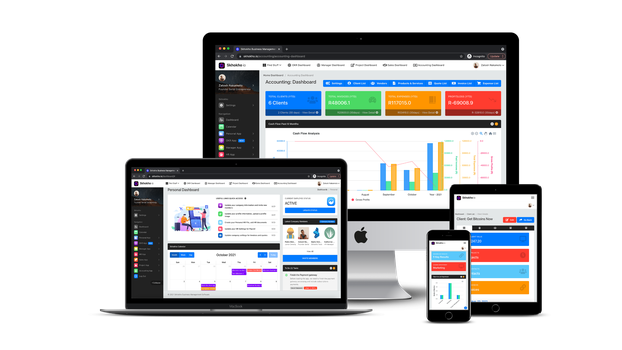Running and Managing Lean Startups
If you're an entrepreneur, you know that time is always of the essence. You don't have time to waste on inefficient processes or products that don't meet customer needs. That's where a lean start up come in.
Lean startups are all about efficiency and effectiveness. They focus on creating a minimum viable product (MVP) that meets customer needs and then iterating on that product based on feedback. This allows startups to avoid wasting time and resources on products that may not be successful.

If you're interested in learning more about lean startup principles, this blog is for you. We'll cover everything from what a lean startup is to how you can manage one.
This blog will cover the following:
- What is meant by lean startup?
- Lean Startup vs Traditional Startup Approaches
- The fallacy of the perfect business plan
- 5 principles of lean startup method
- How Softwares can help managing a Startup
- Best software for Startups
What is meant by lean startup?
The lean startup is a new way of approaching the startup process that emphasises speed, iteration, and customer feedback. The goal is to get a minimum viable product (MVP) out to market as quickly as possible and then use customer feedback to guide further development. The lean startup approach is different from the traditional startup approach in a few key ways:
1. The focus is on building a minimum viable product (MVP) instead of a fully-featured product. The MVP is a version of the product that has just enough features to be usable by early adopters.

2. The MVP is released as soon as it is ready, instead of waiting until the product is perfect. This allows for early feedback from customers, which can be used to guide further development.
3. Development is done in short cycles (called "sprints") of rapid iteration and testing. This allows for more flexibility and faster response to customer feedback.
The approach has been popularised by Eric Ries, who wrote a book called The Lean Startup.
Lean Startup vs Traditional Startup Approaches
There are many different approaches that startups can take when starting up their business. The two most popular approaches are the Lean Startup approach and the traditional startup approach. Both of these approaches have their own advantages and disadvantages.
The Lean Startup approach is all about starting small and learning as you go. This approach is great for startups that are trying to figure out their business model and what their customers want (customer development). The downside of this approach is that it can take a long time to get your business off the ground.

The traditional startup approach is all about starting big and making a splash. This approach is great for startups that already have a clear idea of their business model and what their customers want. The downside of this approach is that it can be very expensive and you might not have the resources to sustain a big launch.
So which approach is right for you? It depends on your specific situation. If you're not sure what your business model is or what your customers want, then the Lean approach is probably a good idea. If you have a clear idea of your business model and you're confident that you can make a big splash, then the traditional startup approach might be a better option.
The fallacy of the perfect business plan
According to convention it's important to create a business plan - a static document describing the size of opportunities, the problem that needs solving, and the solution the business plan offers. In general, the report includes five years' projections of revenue, profits and income.
In short, business planning is an exercise of research done on a computer screen before any business owner begins building a product. The theory is that it is possible for entrepreneurs to know many unknown facts about their business before they start raising funds to implement their ideas.

The perfect business plan is a myth. There's no such thing as perfect business plans because every business is different. A business plan is a tool that you can use to help you achieve your business goals, but it's not the be-all and end-all. You need to be flexible and adaptable to succeed, and that means being open to change your business plan as you go. Trying to stick to a rigid plan will only lead to frustration and ultimately, failure.
Don't get me wrong, a business plan is still a valuable tool. It can help you articulate your business goals, and it can give you a roadmap to follow. But you need to be prepared to change your plan as you learn more about your business and your customers. The perfect business plan doesn't exist, so don't waste your time looking for it.
What are the 5 principles of lean startup method?
The lean startup is a new approach to business that emphasises speed, innovation, and efficiency. The goal is to create a new product or service as quickly and cheaply as possible, and then use customer feedback to improve the products and services.
The lean startup approach has five key principles:
- Entrepreneurs are everywhere;
- Startups are all about learning;
- Validated learning;
- Build-measure-learn; and
- Innovate around the core.
1) Entrepreneurs are everywhere:
A this approach can be applied to any new venture, whether it’s a tech startup, a social enterprise, or a more traditional business.
2) Entrepreneurship is management:
The key to a successful startup is not the originality of its product or service, but rather the ability of the team to execute a business model.
3) Validated learning:
A lean startup constantly tests and adjusts its hypotheses about its business model and products or services through experimentation.
4) Build-measure-learn:
The build-measure-learn feedback loop is the key mechanism for validated learning.
5) Innovation accounting:
A lean startup uses innovative accounting to track progress and measure success. This allows the team to focus on the metrics that matter and make data-driven decisions.

These principles are the foundation upon which lean startups are built and operate.
- Eliminate waste - Lean startups aim to identify and eliminate sources of waste in their business models. This includes anything that doesn't add value for the customer or anything that doesn't help the business achieve its goals.
- Build quality in from the start - Lean startups believe that it's important to build a high-quality product from the start. This means creating a product that meets the needs of the customer and is free of defects.
- Deliver value quickly - Lean startups focus on delivering value to the customer as quickly as possible. This means releasing new features and products as soon as they're ready, rather than waiting for a "perfect" product.
- Test and learn - Lean startups believe in the importance of testing and learning. This means constantly experimenting with new ideas and products to see what works and what doesn't.
- Continuously improve - Lean startups are always looking for ways to improve their products and business models. This means constantly making small changes and improvements to the way things are done.
How Softwares can help managing a Startup
There are a number of software applications that can help in managing a lean startup. A lean startup is a type of business that is characterised by a focus on creating a new product or service quickly and efficiently, with a minimum of wasted resources. These software applications can help in a number of ways, including:
- Tracking progress and measuring success:
There are a number of software applications that can help track progress and measure success. This information is crucial in order to make sure that the lean startup is on track and making progress towards its goals.
- Identifying areas of improvement:
The data collected by these software applications can also help identify areas where the lean startup could improve. This information can be used to make changes and improvements that can help the lean startup be even more successful.

- Saving time and resources:
The efficiency and effectiveness of a lean startup can be greatly increased by using software applications. These applications can help save time and resources that would otherwise be wasted.
- Communicating with stakeholders:
Many of these software applications also include features that can help communicate with stakeholders. This communication is important in order to keep everyone up-to-date on the progress of the lean startup and to get feedback that can help improve the product or service.
Best Software For Startups
The best and most successful startups are created by innovative and entrepreneurial teams. With technology becoming so commonplace in our day-to-day lives, it’s no surprise that startups are turning to software to help them get their companies off the ground.
Skhokho is a great example of software that can help startups in a number of ways. Firstly, it provides a simple and effective way for companies to track their progress and growth. Secondly, it allows startups to connect with potential customers and partners through their integrated meeting app. Finally, it’s a great tool for networking and collaboration, making it easy for startups to connect with like-minded individuals and organisations.
If you’re looking for a piece of software that can help your startup to thrive, Skhokho is definitely worth considering.

Skhokho Features
Skhokho has business management tools that allows lean start ups to manage:
- Objective Key Results - You can use Skhokho to set your team's OKRs in accordance with the Objectives and Goals Setting Methodology of OKRs.
- HR and Payroll - Skhokho's HR Management Software helps small businesses manage employee files, manage leave records, and do payroll efficiently. Manage salaries, payslips, and HR policies with your team.
- Employee timesheets and time tracking - Regardless of your business size, you will find our employee timesheet app ideal. Tracking and managing your employees' time is easy with Skhokho.
- Customer information and profiles - This software also allows you to manage your client information effectively.
- Project Milestones, Tasks and Billing - This app allows you to manage project deliverables, milestones and tasks in one place with complete project task management.
- Sales CRM - Follow up on opportunities and leads related to business development. Share documents, notes, and meetings with others.
- Accounting Management - Use Skhokho to track your expenses, bills, clients, and cash flow.
Register for Skhokho
Visit Skhokho today and register today: https://skhokho.io/authentication/register
This software is offered for free for 14 days.
For How to use Skhokho, read their documentation here: https://skhokho.io/documentation/guide/









